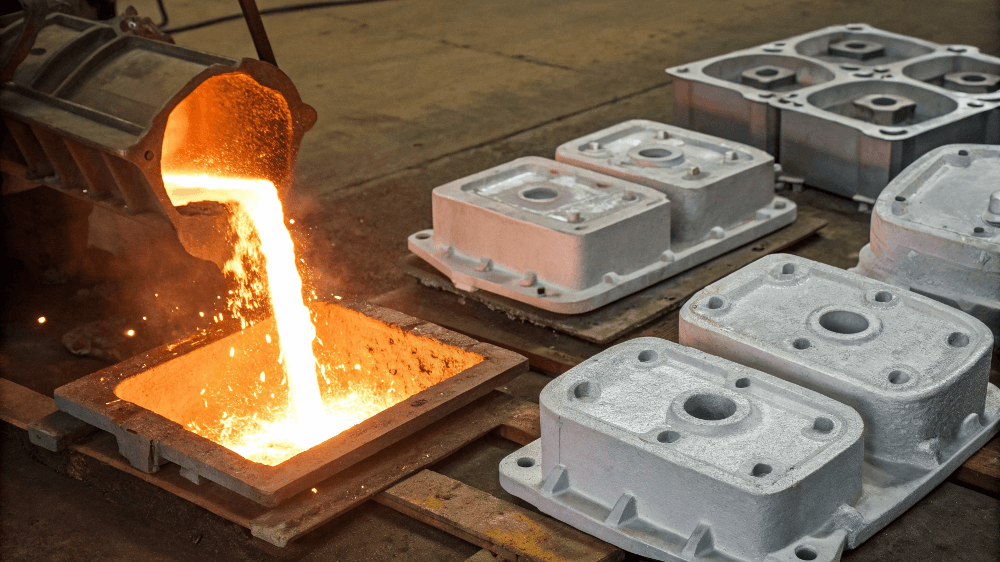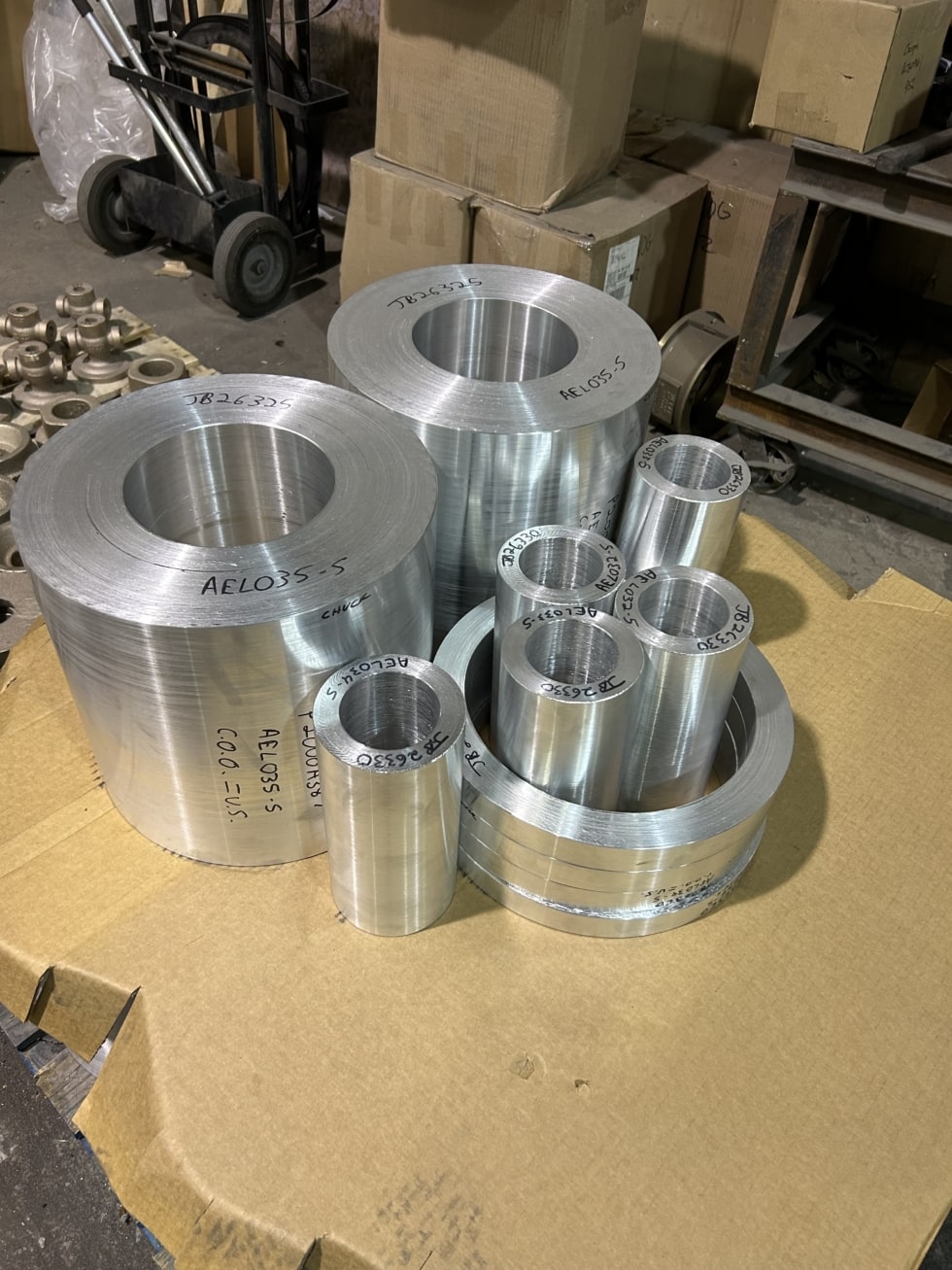Aluminum Foundry Wisconsin delivers customized casting options
Recognizing the Benefits and Innovations in the Aluminum Foundry Market
The Aluminum Foundry market plays a crucial role in contemporary production. Its light-weight buildings notably boost fuel performance, especially in vehicle and aerospace markets. Furthermore, Aluminum's resistance to corrosion assurances durability in different applications. As the industry develops, innovations such as innovative recycling and additive production are reshaping manufacturing approaches. Exploring these developments reveals not only the advantages yet likewise the challenges in advance for Aluminum factories in a quickly changing market.
The Lightweight Advantage of Aluminum
Aluminum's light-weight nature supplies substantial benefits throughout numerous sectors, especially in manufacturing and transport. Its reduced density enables the manufacturing of parts that are easier to take care of and set up, causing lowered labor costs and enhanced performance. In the automotive field, lighter lorries add to improved gas economic situation and lower discharges, lining up with international sustainability objectives. Similarly, in aerospace, using Aluminum lowers the general weight of airplane, which is crucial for enhancing efficiency and minimizing operational prices.
Furthermore, Aluminum's light-weight buildings facilitate cutting-edge designs that were previously impractical with heavier products. This flexibility allows suppliers to produce intricate shapes and frameworks while preserving architectural integrity. Generally, the light-weight advantage of Aluminum not just boosts product performance but likewise drives advancements in innovation and style, making it a recommended product in various applications.
Rust Resistance and Longevity
The Aluminum Foundry industry is renowned for creating materials with remarkable corrosion resistance, making them excellent for various applications. This building, incorporated with enhanced architectural stability, adds to the long-lasting performance benefits that Aluminum elements supply. As a result, sectors significantly rely upon Aluminum to satisfy demanding environmental problems without compromising quality.
Superior Corrosion Resistance
While various metals deal with substantial obstacles from ecological factors, Aluminum stands apart for its remarkable rust resistance, making it a favored selection in lots of applications. This property is primarily due to a natural oxide layer that bases on the Aluminum surface area, giving an obstacle versus wetness and destructive agents. Unlike other steels that might rust or deteriorate gradually, Aluminum preserves its integrity also in rough settings, such as commercial setups or coastal areas. Furthermore, its lightweight nature incorporated with corrosion resistance makes it perfect for applications in aerospace, automobile, and aquatic markets. Generally, Aluminum's exceptional resilience not only enhances item longevity yet likewise lowers maintenance expenses, providing a compelling benefit for producers and customers alike.
Improved Architectural Stability
Engineers and designers significantly identify the significance of enhanced architectural stability in modern applications, where both corrosion resistance and sturdiness are vital. Aluminum alloys, recognized for their lightweight homes, also display remarkable resistance to deterioration, making them ideal for extreme environments. The ingenious techniques used in the Aluminum Foundry industry contribute significantly to producing parts with improved sturdiness. Advanced casting procedures and alloy make-ups are tailored to meet certain efficiency requirements, making sure that structures can withstand extreme problems without endangering integrity. Furthermore, surface area therapies and layers enhance the life expectancy of Aluminum products, even more alleviating deterioration over time. This focus on enhanced structural integrity not only prolongs the functionality of materials however additionally reduces maintenance prices, strengthening Aluminum's setting as a material of option in various markets.
Durable Efficiency Perks
Resilient efficiency in Aluminum parts is greatly connected to their premium deterioration resistance and resilience. Unlike many metals, Aluminum normally forms a protective oxide layer, which prevents corrosion and deterioration in various settings, consisting of marine and industrial settings. This intrinsic residential or commercial property considerably expands the life expectancy of Aluminum items, reducing maintenance and substitute costs. On top of that, the lightweight nature of Aluminum boosts its applicability across industries without compromising toughness. The material's resistance to put on and tear likewise contributes to its integrity in demanding applications, making it a perfect choice for auto, aerospace, and building sectors. As markets increasingly focus on sustainability and longevity, Aluminum's efficiency benefits straighten with modern design demands, solidifying its duty in ingenious production processes.
Ecological Effect and Sustainability
 As the Aluminum Foundry sector develops, it significantly focuses on ecological effect and sustainability, identifying the demand for responsible practices when faced with environment adjustment. Efforts to decrease waste and power consumption are at the leading edge, with several factories embracing reusing campaigns to recover Aluminum scrap. This not just reduces raw material usage but likewise especially reduces down power expense, as recycled Aluminum requires only a portion of the energy contrasted to main manufacturing.
As the Aluminum Foundry sector develops, it significantly focuses on ecological effect and sustainability, identifying the demand for responsible practices when faced with environment adjustment. Efforts to decrease waste and power consumption are at the leading edge, with several factories embracing reusing campaigns to recover Aluminum scrap. This not just reduces raw material usage but likewise especially reduces down power expense, as recycled Aluminum requires only a portion of the energy contrasted to main manufacturing.In addition, advancements in discharges manage innovations are being applied to reduce air contaminants, straightening procedures with stricter ecological regulations. Factories are likewise exploring different power resources, such as solar and wind, to power their centers sustainably. By promoting collaboration with stakeholders, the industry intends to create ingenious services that improve environmental stewardship. Collectively, these efforts highlight a commitment to decreasing the Aluminum my explanation Foundry's carbon footprint while advertising a round economy within the manufacturing market.
Advanced Production Techniques
 Revolutionizing manufacturing processes, the Aluminum Foundry sector is progressively incorporating sophisticated production techniques to enhance efficiency and precision. Methods such as computer system mathematical control (CNC) machining and additive production have arised as necessary elements in maximizing production process. CNC machining permits high-precision element manufacture, considerably reducing product waste and manufacturing time. Additive production opens up brand-new avenues for intricate geometries and lightweight layouts that were previously challenging to attain.
Revolutionizing manufacturing processes, the Aluminum Foundry sector is progressively incorporating sophisticated production techniques to enhance efficiency and precision. Methods such as computer system mathematical control (CNC) machining and additive production have arised as necessary elements in maximizing production process. CNC machining permits high-precision element manufacture, considerably reducing product waste and manufacturing time. Additive production opens up brand-new avenues for intricate geometries and lightweight layouts that were previously challenging to attain.Furthermore, the implementation of automation and robotics in Aluminum factories enhances procedures, minimizes human error, and improves worker security. These modern technologies promote a more responsive manufacturing environment, making it possible for makers to adjust quickly to market demands. The integration of innovative simulation software application reference additionally improves the style and screening phases, resulting in exceptional product high quality. Jointly, these methods not only enhance operational effectiveness however likewise foster advancement, positioning the Aluminum Foundry market at the leading edge of contemporary manufacturing.
Developments in Reusing Procedures
The Aluminum Foundry market is not just progressing in producing methods but is additionally making significant strides in recycling procedures. Advancements are emerging to enhance the efficiency of reusing techniques, decreasing energy consumption and enhancing sustainability. Advanced sorting modern technologies, such as automated optical sorting, enable the identification and splitting up of Aluminum from various other materials with high precision. This leads to a better of recycled Aluminum, which is vital for preserving the integrity of the last products.
Closed-loop recycling systems are being implemented, permitting producers to recycle Aluminum scrap within their very own manufacturing processes. This decreases waste and promotes a circular economic situation. Furthermore, study into new recycling methods, such as hydrometallurgical procedures, provides the capacity for recuperating Aluminum from complex waste streams. These technologies not only contribute to decreasing the carbon impact of the Aluminum Foundry industry however additionally reinforce its economic feasibility in an increasingly ecologically aware market.
Applications Across Numerous Industries
Numerous markets are significantly identifying the flexibility and advantages of Aluminum Foundry items, leading to extensive applications across fields such as auto, aerospace, consumer, and building and construction products. In the auto industry, Aluminum castings add to lightweight automobile designs, enhancing fuel efficiency and performance. Aerospace manufacturers make use of Aluminum parts for their strength-to-weight proportion, crucial for airplane structures and elements.
In building and construction, Aluminum is preferred for its sturdiness and resistance to rust, making it suitable for home window frameworks, roof, and architectural assistances. Consumer products likewise click to investigate gain from Aluminum Foundry items, as seen in kitchenware, electronics, and product packaging, where lightweight and recyclable products are essential.
The flexibility of Aluminum Foundry strategies allows for accurate specs and intricate layouts, accommodating the varied needs of these markets. Therefore, Aluminum Foundry products are coming to be essential to contemporary manufacturing procedures across different fields.
Future Trends in Aluminum Foundries
As industries continue to progress, Aluminum factories are positioned to welcome numerous essential fads that guarantee to enhance performance and sustainability. One famous trend is the raising adoption of electronic modern technologies, including automation and expert system, which improve procedures and enhance quality assurance. Additionally, the push towards sustainable techniques is leading shops to buy reusing innovations, significantly lowering waste and energy intake.
 Another emerging fad is making use of innovative alloys and materials, catering to the growing need for lightweight and long lasting elements throughout various markets (Aluminum Foundry). Furthermore, the combination of additive manufacturing strategies is anticipated to reinvent part design, providing modification and decreasing preparations
Another emerging fad is making use of innovative alloys and materials, catering to the growing need for lightweight and long lasting elements throughout various markets (Aluminum Foundry). Furthermore, the combination of additive manufacturing strategies is anticipated to reinvent part design, providing modification and decreasing preparationsCooperation with research organizations is additionally anticipated to drive innovation, as factories seek to create new processes and materials. Aluminum Foundry. Collectively, these trends suggest a transformative future for the Aluminum Foundry market, lining up with wider objectives of sustainability and performance
Frequently Asked Questions
What Are the Common Costs Related To Aluminum Foundry Production?
The regular prices associated with Aluminum Foundry manufacturing consist of raw products, labor, power, devices maintenance, and overhead expenses. These elements collectively affect the overall monetary investment needed for effective Aluminum spreading procedures.
Just How Does Aluminum Contrast to Various Other Steels in Stamina?
Aluminum, while lighter than many metals, displays remarkable strength-to-weight proportions. Compared to steel, Aluminum is less solid yet uses exceptional rust resistance, making it a beneficial selection in applications where weight and sturdiness are important.
What Precaution Remain In Location in Aluminum Foundries?
Precaution in Aluminum shops normally consist of mandatory individual protective tools, ventilation systems to control fumes, regular tools maintenance, training programs for staff members, and adherence to stringent safety laws to lessen risks related to molten metal handling.
How Is Quality Assurance Managed in Aluminum Spreading Processes?
Quality control in Aluminum casting procedures involves extensive inspections at different stages, consisting of raw material assessment, procedure monitoring, and final product screening. Techniques such as statistical procedure control and non-destructive testing warranty adherence to industry requirements.
What Certifications Are Very Important for Aluminum Foundry Distributors?
The value of qualifications for Aluminum Foundry providers consists of ISO 9001 for top quality monitoring, ISO 14001 for environmental monitoring, and industry-specific standards like ASTM and SAE, guaranteeing compliance, safety, and dependability in producing procedures.
The Aluminum Foundry industry plays a crucial function in contemporary manufacturing. The Aluminum Foundry market is renowned for generating products with exceptional deterioration resistance, making them optimal for numerous applications. Transforming manufacturing processes, the Aluminum Foundry industry is significantly integrating advanced manufacturing methods to improve effectiveness and accuracy. The Aluminum Foundry sector is not just progressing in making strategies but is also making significant strides in recycling processes. As sectors continue to evolve, Aluminum foundries are poised to embrace several key trends that promise to enhance performance and sustainability.